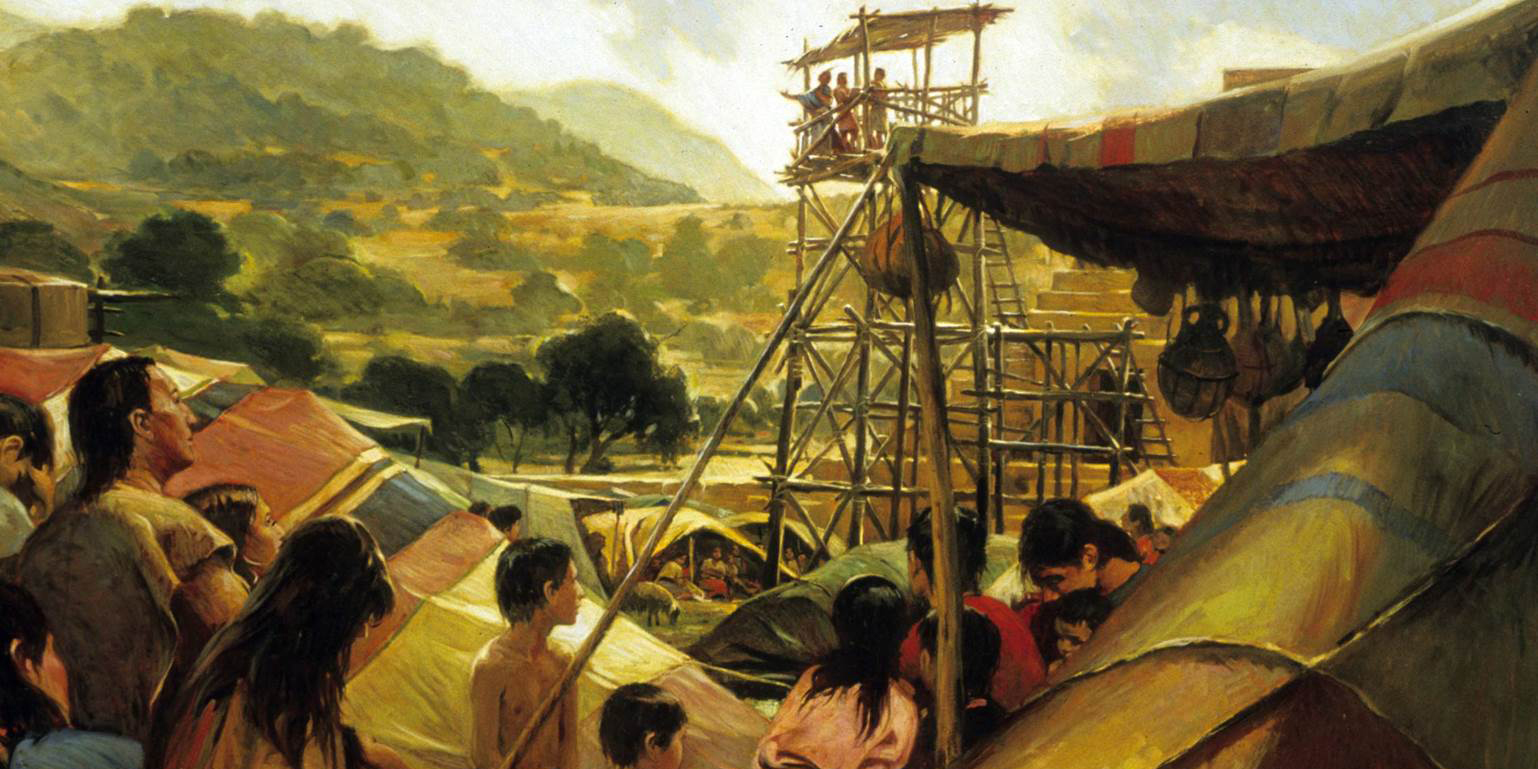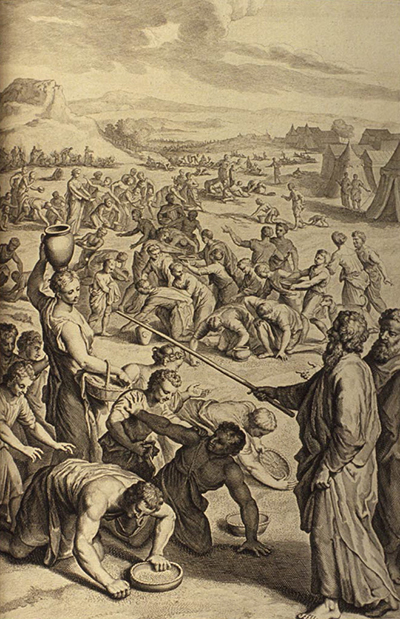
The Know
Following King Benjamin’s proclamation, his people gathered together from throughout the land of Zarahemla to go up1 to the temple to hear the words of their king (Mosiah 2:1). As they congregated around the temple with their families, the people set up tents for their families, each tent having its door open towards the temple. The people remained in their tents as they listened to King Benjamin speak (Mosiah 2:5–6).
The reason why they did these things is not explained in the text. Mosiah 2:7 explains that the multitude was so great that Benjamin had to have a tower constructed so that his voice would reach more people. It seems that this problem could have been partially prevented by the gathered families setting up their tents elsewhere and gathering themselves in closer to the temple, without the tents. Why did they have to remain in their tents?
LDS scholars have argued convincingly that this gathering at the temple to hear a speech was no ordinary occasion, but that the account in Mosiah 2–6 closely resembles what we know about ancient Israelite temple pilgrimage festivals.2 One of the most important of these, and one which has many parallels to King Benjamin’s temple gathering, is the Feast of Tabernacles (Sukkot in Hebrew). The following chart illustrates some of the interesting similarities:
| Feature | Old Testament | King Benjamin's Speech |
|---|---|---|
| Travel to the temple (with family) | Deuteronomy 16:14; 31:10–12 | Mosiah 2:1, 5 |
| Remain in booths/tents | Leviticus 23:41–44; Exodus 33:8; 1 Kings 8:55–56; Hosea 12:9 | Mosiah 2:5, 6 |
| Speaker on platform | Nehemiah 8:4 | Mosiah 2:7 |
| Sacrifices | Numbers 29:12–34; Exodus 24:5 | Mosiah 2:3 |
| Reading law and renewal of covenant; commandments | Deuteronomy 4:1-9, 11–25; 31:11; Nehemiah 8:1–3, 5 | Mosiah 2:13, 22, 31, 41; 4:6, 30; 4:1–3; 5:1–8 |
| Blood of the covenant applied to people3 | Exodus 24:8; Leviticus 16:14, 19 | Mosiah 3:11; 4:2 |
| Blessings/curses | Deuteronomy 27:14-26 | Mosiah 2:22, 33 |
| Ritual response, prostration on ground | Nehemiah 8:6 | Mosiah 4:1; 5:2 |
The Why
If King Benjamin’s speech in Mosiah 2–6 took place as part of a Nephite celebration of the ancient Israelite Feast of Tabernacles, that would explain many of the elements described in the narrative as found in the Book of Mormon, including the details regarding the setting up of tents around the temple and the people remaining in them to hear their king speak.
LDS scholars Terrence L. Szink and John W. Welch commented on this:
It is evident in Benjamin’s speech that the tents are ceremonially significant. … Everyone had a tent, not just those who had come from out of town and needed a place to stay. Furthermore, they all remained in their tents during the speech, surely for ceremonial reasons. If it had not been religiously and ritually important for them to stay in their tents, the crowd could have stood much closer to Benjamin and been able to hear him, obviating the need for written copies of his words to be prepared and circulated (see Mosiah 2:8). Apparently Benjamin considered it more important for the people to remain in their tents than to have them stand within close hearing distance of the speaker.4
The ancient Israelites were commanded to build ceremonial booths/tents, temporary shelters made from tree branches (see Leviticus 23:40), as part of the celebration of the Feast of Tabernacles. According to Leviticus 23:42-43, the Lord commanded: “Ye shall dwell in booths seven days; all that are Israelites born shall dwell in booths: so that your generations may know that I had the sons of Israel live in booths when I brought them out from the land of Egypt.” The Lord wanted his people to remember what their forefathers had gone through and how He, their God, had delivered them from bondage and from their afflictions.
Szink and Welch further explain, regarding the Nephite gathering: “To the Nephites, their festival use of tents may also have symbolized the time when Lehi and his family had ‘dwelt in a tent’ (1 Nephi 10:16), for Benjamin convenes his celebration in part to remember the distinctiveness of his people, whom ‘the Lord God hath brought out of Jerusalem’ (Mosiah 1:11).”5The idea of remembering is a key factor in covenangt renewal and in living the gospel, as we see in King Benjamin’s speech, where he speaks of "remembering" fifteen times.6/p>
Remembering our covenants is not only important to King Benjamin, but also to the Book of Mormon as a whole. One of the expressed purposes of the book, as outlined by Moroni on the title page of the book, is to help readers to remember “the covenants of the Lord, that they are not cast off forever.” Just as the Israelites and Nephites built booths/tents to remind them of what God had done for their forefathers and the covenants he had made with them, so we have the Book of Mormon, the Temple, and so many things that can serve as reminders to us as well. From King Benjamin's counsel, we can learn that "remembering" our promises to the Lord will turn our thoughts and actions to him. As the children of Israel in the wilderness and the Nephites in the promised land learned, if we "remember" the Lord, we can find shelter from life's storms.
Further Reading
Terrence L. Szink and John W. Welch, “An Ancient Israelite Festival Context,” in King Benjamin’s Speech: “That Ye May Learn Wisdom" (Provo, UT: FARMS, 1998), 148-223.
John A. Tvedtnes, “King Benjamin and the Feast of Tabernacles,” in By Study and Also by Faith: Essays in Honor of Hugh W. Nibley, ed. John M. Lundquist and Stephen D. Ricks (Salt Lake City: Deseret Book and FARMS, 1990), 2:197-237.
Book of Mormon Central, “Did Jacob Refer to Ancient Israelite Autumn Festivals?” KnoWhy 32 (February 12, 2016).
- 1. For more on the significance of going “up” to the temple, see Book of Mormon Central, “Why Does Nephi Always Go Down to the Wilderness and Up to Jerusalem? (1 Nephi 3:4),” KnoWhy 6 (January 7, 2016).
- 2. For a comparison between Jacob’s speech and the ancient Israelite autumn festivals, see Book of Mormon, “Did Jacob Refer to Ancient Israelite Autumn Festivals? (2 Nephi 6:4),” KnoWhy 32 (February 12, 2016).
- 3. For more on this, CITE KNOWHY #82
- 4. Terrence L. Szink and John W. Welch, “An Ancient Israelite Festival Context,” in King Benjamin’s Speech: “That Ye May Learn Wisdom" (Provo, UT: FARMS, 1998), 148–223, at 186.
- 5. Szink and Welch, “An Ancient Israelite Festival Context,” 185–186.
- 6. See Mosiah 1:3, 4, 6, 7, 17; 2:40, 40, 41, 41; 4:11, 28, 30; 5:11, 12; 6:3.
Continue reading at the original source →




